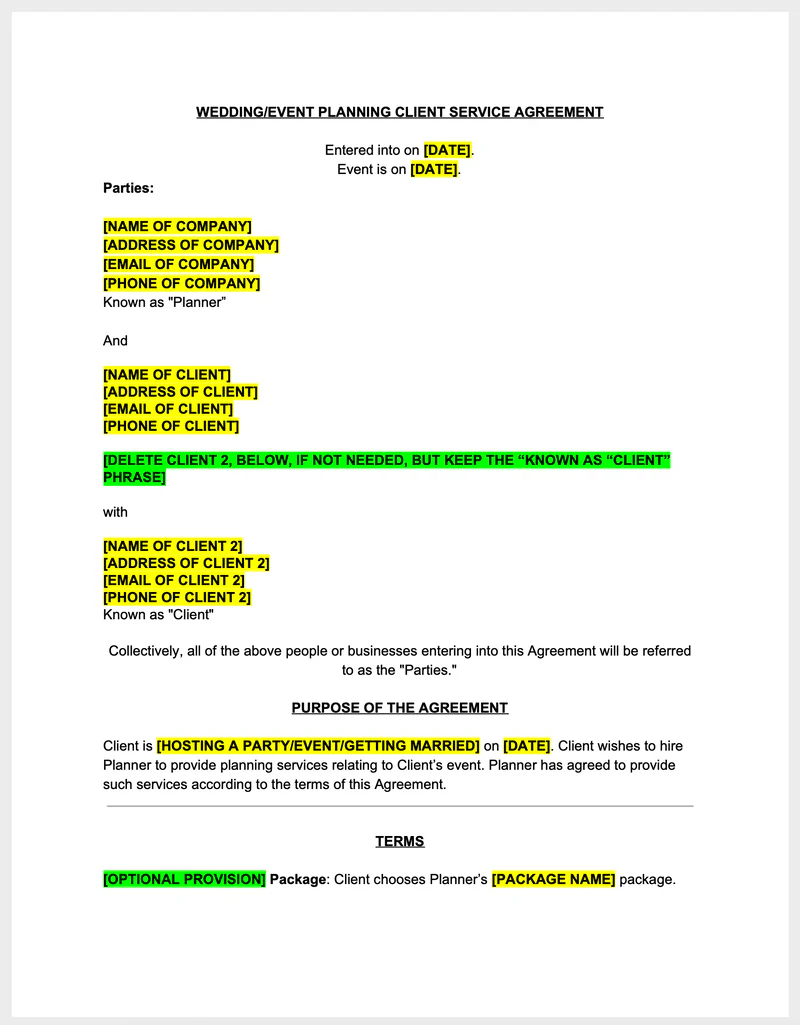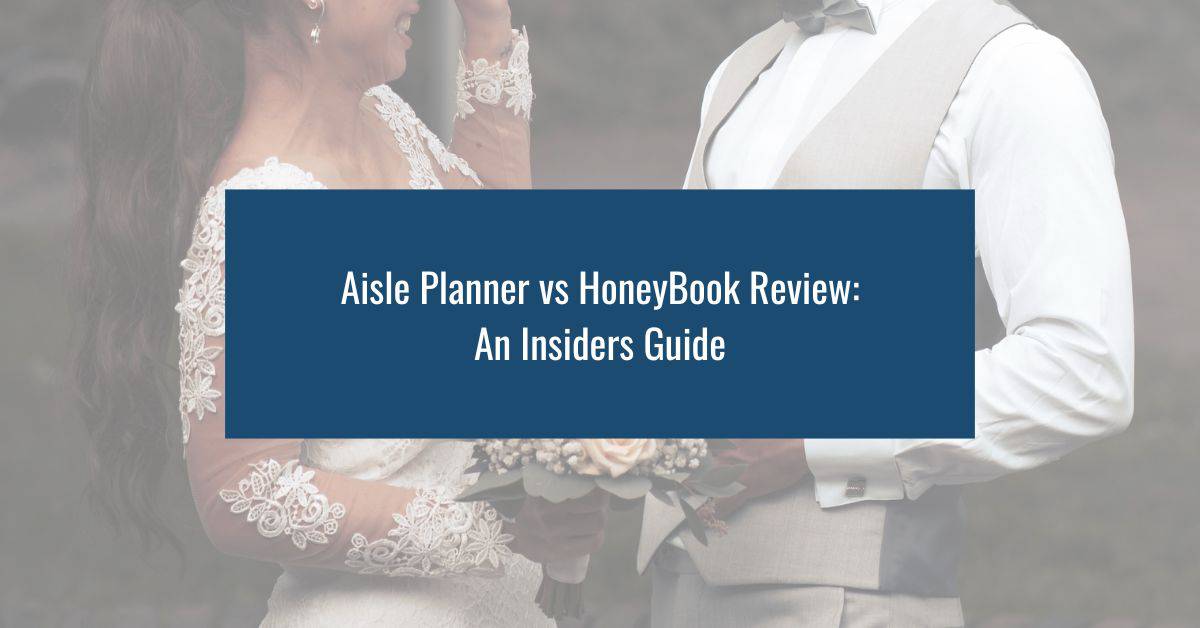It should go without saying that having a wedding planner contract helps to protect you, your business, and your clients. While it’s quick and easy to book a client and start working without all the extra “paperwork”. Having your policies and expectations laid out and agreed upon, can protect everyone involved if an issue arises.
I can attest to this personally, as someone who lost over $10,000 on business transactions due to not having a proper contract in place.
In this post, we’ll be covering some of the things to think about when developing a wedding planner contract. As well as samples and templates that you can use in your business right now.
Are you ready?
6 Must-Have Clauses for your Wedding Planner Contract
Your wedding planner contract should include all the clauses most important to you and your business. But it should also include the standard ones that will protect your business no matter the client.
Contact Information & Event Details:
This is where you will include information about you, your business, and the client. This is pretty standard in most agreements and will usually be your names, contact information, and specifics about the event, such as the date, time, location, and any additional events that are included, for example, a rehearsal dinner.
Services Provided:
Your wedding planner contract should also include the services that are being provided. Make no assumptions here. Include a detailed breakdown of what is being agreed upon and clearly outline expectations. What services are you responsible for providing as the planner? and what are the client’s responsibilities? This could also include miscellaneous items such as travel expenses etc.
Fees and Payment Schedule:
In this section of your wedding planner contract, you want to outline the agreed-upon fees, packages, and payments. This is also where you should articulate any payment schedules—specifically payment dates, amounts, deposits, and any late fee policies. See a sample page from a wedding planner contract below for your reference.

Cancellation Policy:
In the case of unforeseen circumstances, what are the options available to you and your client? Your cancellation policy is the area in your agreement where you will make this clear. Be sure to include information on the process for cancellation by either party, timelines for canceling, as well as any associated fees.
This is also where you’ll often hear the term “force majeure”. But what is the force majeure clause for weddings? The force majeure clause essentially outlines what happens in the case of unforeseen circumstances, for example, a natural disaster. Meaning, will the wedding and related events be canceled or rescheduled? Will deposits be returned? Will the deposits be returned in full or partial? All of these questions and more should be outlined here.
Limitations of Liability:
The limitations of the liability clause are another standard and important component of your wedding planner contract. It outlines the extent of the planner’s liability in the event of unforeseen circumstances, such as bad weather, vendor issues, and other damages. Essentially this is aimed at protecting (aka limiting) the planner from being responsible for expenses or damages outside of their control.
Dispute Resolution:
While all clauses are important, this one might be one of our favorites because it outlines the process for resolving any disagreements that could arise. This is especially important if you’re even at an impasse with a client or just cannot agree on how to move forward on a specific issue.
These are just some of the standard clauses that should be included in your wedding planner contract. There are many more that might apply to your business not discussed here such as privacy, confidentiality, publicity and/or photo releases, communication, and indemnification, to name a few. This is one of the reasons why we usually recommend having a contract that is drafted and/or reviewed by a Lawyer.
Contract Red Flags and Common Mistakes to Avoid
As a wedding planner, your contract serves as the foundation of your client relationships. However, certain contract mistakes can leave you vulnerable to disputes, legal issues, or financial losses. Here are the critical red flags and common pitfalls to watch out for when creating or reviewing your wedding planner contract.
Vague or Ambiguous Language
One of the most dangerous contract mistakes is using imprecise language that leaves room for interpretation. Watch out for:
- Terms like “reasonable,” “timely,” or “appropriate” without specific definitions. For example, instead of saying “Services will be delivered promptly,” specify “Final timeline will be delivered 30 days before the event date.”
- Unclear scope of services that doesn’t detail exactly what’s included and excluded. Your contract should explicitly list every service you’re providing, from venue selection to day-of coordination, and specifically state what’s not included to prevent scope creep.
- Ambiguous payment terms that don’t specify exact amounts, due dates, and accepted payment methods. Replace “Final payment due before the wedding” with “Final payment of $X due 14 days before the wedding date via bank transfer or certified check.”
Missing Essential Clauses
Many wedding planners inadvertently omit crucial clauses, like the ones discussed above, that could protect their business. Don’t forget to include:
- Cancellation and postponement policies that address both client-initiated and planner-initiated cancellations, including specific refund schedules and terms for rescheduling.
- Force majeure provisions that account for circumstances beyond your control, such as natural disasters, pandemics, or venue closures. The COVID-19 pandemic for example taught us the importance of having comprehensive force majeure clauses.
- Confidentiality agreements protecting both your client’s privacy and your business. This is especially important for high-profile clients or unique event designs.
Unenforceable Terms
Including terms that wouldn’t hold up in court can give you a false sense of security. It’s important to be wary of:
- Excessive liability limitations that attempt to waive all responsibility for your services. While you can limit liability, you cannot completely eliminate it for your professional services.
- Penalties or fees that could be considered punitive rather than compensatory. Ensure any late fees or cancellation charges are reasonable and relate to actual costs or losses.
- Non-compete clauses that are too broad or restrictive, particularly regarding working with venue-recommended vendors or at specific locations.
Insurance and Liability Oversights
Don’t leave yourself exposed by overlooking insurance-related contract elements. Here are some examples for your reference:
- Failing to require proof of vendor insurance, particularly for high-risk services like catering or pyrotechnics.
- Not specifying minimum coverage requirements for vendors working under your coordination.
- Omitting clauses about client responsibility for guest actions or property damage during events.
Documentation and Communication Gaps
Protect yourself from misunderstandings with the proper documentation. You can include detailed communication notes specifying response times, preferred methods of contact, and emergency procedures. Your business should also adhere to document change request procedures, including how modifications to the original agreement will be handled and any associated fees. Most importantly, you should maintain clear records of all contract versions and amendments, with signed acknowledgments from all parties.
Practical Solutions and Best Practices
To avoid these common pitfalls:
- Have a legal professional review your contract template annually to ensure it remains current with local laws and industry standards.
- Create a contract review checklist to ensure all essential elements are included in every client agreement.
- Maintain a database of real scenarios and issues you’ve encountered to inform future contract updates.
- Include clear dispute resolution procedures, preferably specifying mediation before litigation.
- Regularly review and update your contract based on client feedback and industry changes.
Remember, your contract should be a living document that evolves with your business. Schedule regular reviews and updates to ensure it continues to protect your interests while serving your clients effectively.
The Importance of a Lawyer-Reviewed Wedding Planner Contract
Contracts often include legalese and clauses that can at times be confusing or misunderstood. For this reason, having a lawyer review your wedding planner contract will ensure that the wording in your contract is clear and protects your business. Depending on your location, there might also be laws specific to your city or state, which a Lawyer would be familiar with. If your services are niche, a Lawyer can also include non-standard clauses specific to your business. But most importantly, a Lawyer can identify any potential issues or loopholes in your current wedding planner contract and suggest ways to avoid these.
Also read: How to Find the Best Lawyer for your Event Planning Business

Frequently Asked Questions About Wedding Planner Contracts
Do I need a Lawyer to review my contract?
While it’s possible to create a contract using free templates you can find online, having a Lawyer-reviewed contract is recommended. Contracts often include legalese and clauses that can at times be confusing or misinterpreted. For this reason, having a lawyer review your wedding planner contract will ensure that the wording in your contract is clear, concise, and protects your business. Depending on your location, there might also be laws specific to your city or state, which a Lawyer would be familiar with. If your services are niche, a Lawyer can also include non-standard clauses specific to your business. Most importantly, a Lawyer can identify any potential issues or loopholes in your current wedding planner contract and suggest ways to avoid these.
Can I Use a Free Template from the Internet?
While free templates can provide a starting point, relying solely on them carries significant risks. Free templates often offer a one-size-fits-all solution but rarely account for your unique business model. This is why we recommend using a template, to ensure it’s at least one created by a Lawyer, such as the event and wedding planner contract templates offered by The Contract Shop.
How Often Should I Update My Contract?
Contract updates should occur regularly to maintain effectiveness, especially after each client or event where you’ve identified a gap in your policies. But on average, a once a year review can help to ensure your contract is still serving your business.
Should I Have Different Contracts for Different Services?
Yes. This can be achieved by having a well-done full-service wedding contract and creating different versions to meet your other services, such as day-of wedding coordination. Just ensure that each version of your contract reflects the specific scope, timeline, and responsibilities of that service or package.
Wedding Planner Contract Templates & Examples
If you don’t have the budget to hire a Lawyer, there are many places online where you can purchase wedding planner contract templates. One that we recommend is The Contract Shop. The templates there are drafted by Lawyers and customized for Event and Wedding Planners. Here are some examples:
Event or Wedding Planner Contract Template
With this template, you can make a strong first impression with your new clients while protecting your interests with a well-written contract. This template is attorney-drafted and reviewed and is written in easy-to-understand language so you can feel confident in understanding your new contract and explaining it to clients.

Assistant Planner Contract Template
If you also hire assistants to work with you on events, then this contract is recommended. It outlines roles, responsibilities, expectations, and liabilities to name a few. This is highly recommended when working with any employee or contractor to ensure that everyone is on the same page.

Additional Documentation to Protect your Wedding Planning Business
While your primary wedding planner contract forms the foundation of your client relationship, additional documentation provides crucial support and clarity for your wedding planning services. These supplementary documents help prevent misunderstandings, establish clear processes, and provide extra legal protection for your business (if needed). Here’s a list of my recommended documents to have in your business:
- Client Questionnaire
- Timeline Agreements
- Vendor Coordination Forms (Example: Vendor contact list with emergency numbers)
- Change Order Documentation (Example: Client approval signatures on all changes)
- Communication Records (Example: Email correspondence archives)
- Budget Management Documents (Example: Expense tracking forms or reports)
- Emergency and Contingency Planning (Example: Health and safety guidelines)
- Post-Event Documentation (Example: Final vendor payments and gratuities)
Remember that thorough documentation isn’t just about protection—it’s about providing exceptional service. Well-organized documentation helps you run your business more efficiently, provides better client experiences, and creates opportunities for growth.

Conclusion
To recap, here is a quick checklist of clauses that could be included in your wedding planner contract:
- Contact Information: Names and contact details of both the couple and the wedding planner.
- Event Details: Specific date, time, and location of the wedding. Indicate if additional events (engagement party, rehearsal dinner) are included.
- Services Provided: Detailed breakdown of the planning services offered by the planner (venue selection, vendor management, etc.).
- Fees and Payment Schedule: Outline of the total fee for your services. Breakdown of payment schedule (deposit, installments, final payment and late fees).
- Cancellation Policy: Clear terms for cancellation by either party, including timelines and any fees. Outline what happens in case of force majeure.
- Responsibilities: Define the responsibilities of both the couple and the planner. This could include communication, decision-making processes, and budget.
- Vendor Management: Specify who is responsible for contracting, approving and managing vendors (planner or couple).
- Limitations of Liability: Define the planner’s liability in case of unforeseen circumstances (bad weather, vendor issues, etc.)
- Confidentiality Clause: Protects sensitive information shared between the couple and the planner.
- Dispute Resolution: Outline the process for resolving any disagreements that may arise (mediation, arbitration, etc.)
When a client relationship is good it feels like a contract might not even be needed. But take it from us, we’ve seen cases where a contract was not in place and disputes had to be taken to court. It is important to have a well-written wedding planner contract in place to ensure that you and your business are protected. Most importantly, wedding planning is stressful enough and this is one additional item you can check off your list and not have to think about.
One of the best ways to ensure that your contracts are doing their job is to encourage your clients to review them before signing. Also be open to questions from your clients about your contract, to ensure that terms are clear and everyone is on the same page.
If you are currently building your wedding planning business and have questions, don’t hesitate to schedule a session to pick our brain!



